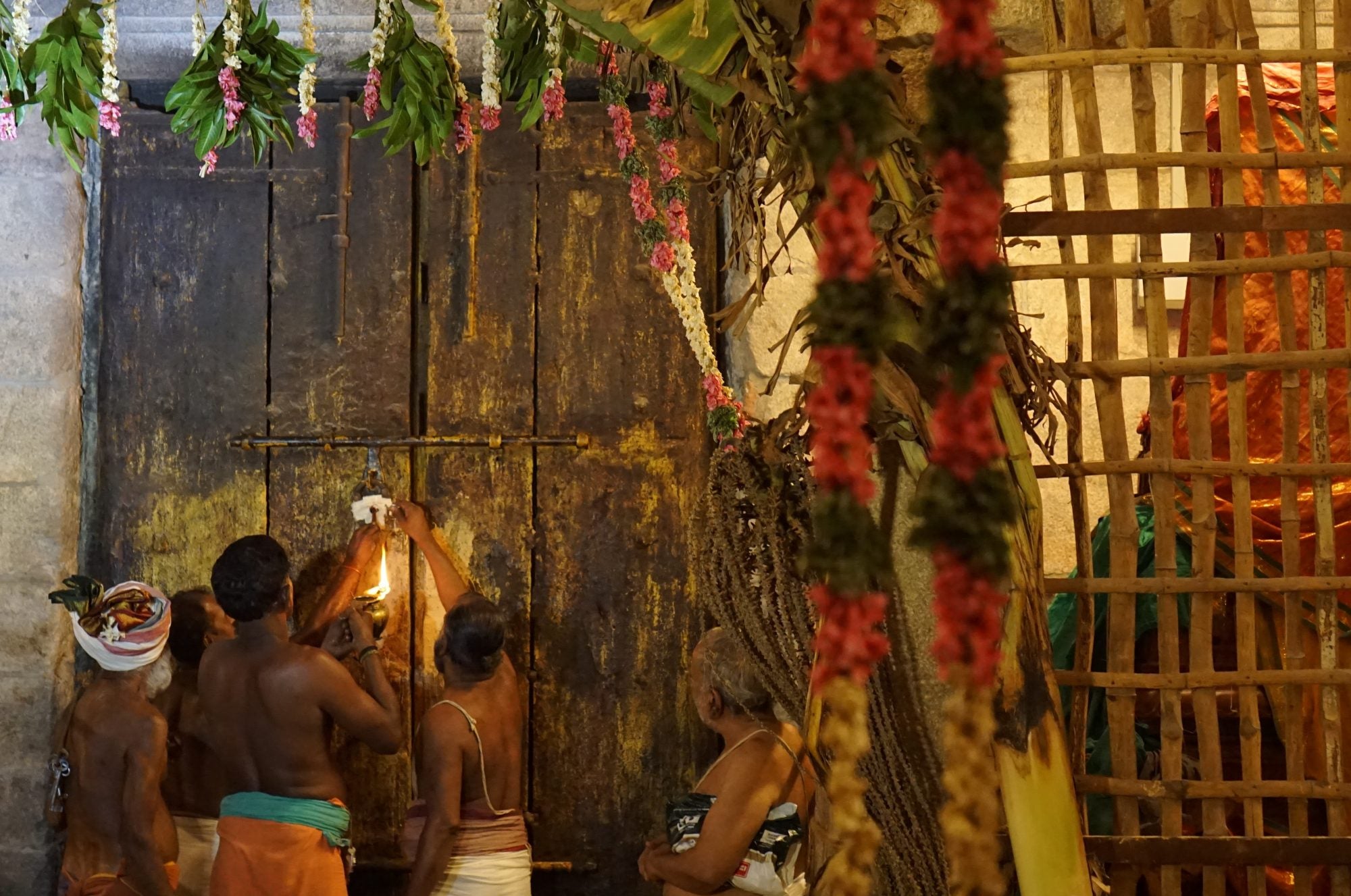January 5, 2018
[slideshow_deploy id=’431′]
Yesterday, the 8th day (evening) of the Ira Pattu Utsavam, was the Vetu Pari (The Hunt), a re-enactment of Tirumankai’s initiation, and the moment that leads him to become a poet. I am repeatedly reminded by people here in Tirukkurungudi that this is a laukika festival, merely for pleasure and enjoyment. It is indeed worldly and of the world–I keep returning to this theme of how poetry makes worlds. Poetry is surely then, the most laukika of things.
The Vetu Pari here in Tirukkurungudi has a markedly different feel to the ones in Srivaikuntham, Tentirupperai and Alvar Tirunagari. This, I think, partly has to do with the fact that at each of those temples, Vetu Pari is but the first of three such “dramas” that lead up to the Adhyayanotsavam’s climax, which is Nammalvar’s moksam (Day 10). Here, at Tirukkurungudi, it is a stand-alone (at this time, although I am told that once upon a time, here too there was a three act drama leading up to alvar moksam (and vitu-vidai…more on this later). It also most certainly has to do with space as well (more on this below).
Nambi is mounted on one of the most beautiful and intricately designed vahanas I’ve seen. He’s a brass horse, with splendid glass eyes. Nambi is dressed opulently and looks like the Srirangam-Vijayanagara sculptures of the horse-riders come to life. From the tops of his pearl draped velvet turban to the tips of dashing parrot-green jodhpurs, it was an utterly delicious sight. Rama Bhattar Govindan is extraordinary, virtuosic, really, in his art of alankara. While some of this surely owes to his over 45 years of practicing this loving art, there is a particular enjoyment, anubhava, that comes through in the care with which he creates these alankaras. I stand in awe at his abilities, at each of the tirukkolams, more beautiful than the previous. Most often, in these cases where the god is mounted on vahana, he looks disproportionate and is dwarfed by the vahana. But not here–everything was so perfectly positioned that there really seemed to be a suppressed kinetic energy in the horse and its divine rider.
This Utsavam involves a conversation between Nambi and Tirumankai, about the latter’s nefarious ways. The high-point of course, is that Tirumankai steals the most precious of things, wrests the 8-syllables of the asta-aksara from Vishnu himself. Tirumankai looks so benign and docile here in Tirukkurungudi–one devotee mentioned to me yesterday that since this is the place that he spent his last years, the image of Tirumankai represents him in his old age. Images tell us stories, and they make us tells stories, imagining entire lives for them, entire emotional lives.
At the conclusion of the festival, when Tirumankai has been honored and a palm-leaf recording everything (all the promises made and kept: Anna Seastrand, writing, again!) has been presented to him, the gosti, lead by the Jiyar Svamikal breaks into the first ten verses of the Periya Tirumoli–vatinen vati varundinen manattal. I always wait for this moment in the Vetu Pari, because it is so powerful, and everything leads up to it. It also very clearly marks a moment when the gosti speaks as the alvar poet. How many times do we get to watch a poet being born? How many times do we get to celebrate that birth?
I have many unanswered questions about the Vetu Pari Utsavam at Tirukkurungudi. I thought many of them would be answered as I watched it unfold. Instead, my questions have only multiplied.
The festival unfolds quite differently than in other temples. It also feels very different, for the Tirukkurungudi temple is massive, descending those steps, through the wide, wide gates of the gopurams, you feel the largeness of Nambi, who towers over you. The original icon is actually quite small–but through alankara, mounted on this enormous horse–he looks positively imposing. In contrast, Tirumankai is virtually devoid of ornamentation, save his spear, a bright pink cloth wrapped around his body and a garland of fresh flowers. In front of Vishnu he is tiny. I suppose that is the point.
For me, poetry has always been at the heart of all endeavors. It’s what comforts me in the dimmest of days, in the darkest of hours. Poetry makes worlds. And so it was, most manifestly, yesterday.
